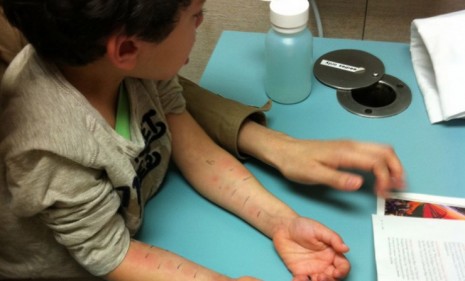How far should schools go to protect a student's allergy?
An elementary school in Florida causes an uproar by enforcing strict rules to protect a 6-year-old with a severe peanut allergy

A free daily email with the biggest news stories of the day – and the best features from TheWeek.com
You are now subscribed
Your newsletter sign-up was successful
A Florida elementary school has riled parents by imposing exacting rules to protect a first-grader with a severe peanut allergy. All students must wash their hands and mouths after lunch. Desks must be regularly bleached, and no outside food is permitted, even for parties. Parents have picketed, saying the rules are disrupting classes, and that the allergic child should just be homeschooled. Administrators say the child's allergy is so severe that it qualifies as a disability, so they must do whatever it takes to make her safe. Is it fair to go this far for a single student?
Absolutely. The girl's health comes first: This child's allergy is so severe that contact with mere traces of peanut could kill her, says Margaret Hartmann at Jezebel. So even if the new rules are "annoying," they're justified. Instead of teaching kids to "ostracize and harass people with disabilities," the other students' parents should be teaching them "it's important to help their classmate."
"Parents protest to remove 6-year-old with peanut allergy from class"
The Week
Escape your echo chamber. Get the facts behind the news, plus analysis from multiple perspectives.

Sign up for The Week's Free Newsletters
From our morning news briefing to a weekly Good News Newsletter, get the best of The Week delivered directly to your inbox.
From our morning news briefing to a weekly Good News Newsletter, get the best of The Week delivered directly to your inbox.
Homeschooling is a better solution: If this child's health is so precarious, says Gig Veres at Gather, her life is at risk any time another 6-year-old forgets to wash his hands — and that's bound to happen frequently. Homeschooling is a perfectly reasonable alternative given what's at stake. "What is unreasonable is placing small children in the position of potentially, even if inadvertently, causing the death of a fellow student."
"Life-threatening peanut allergy: Should a first grader be home-schooled because of it?"
A little sacrifice is hardly too much to ask: There are plenty of children in public schools with special needs, says Ann Bibby at Care2. Accommodating them "sometimes impacts other kids in the classroom, but in the real world," that happens all the time. Surely we haven't reached the point where "the welfare of others must take a back seat when we are asked to step up and sacrifice even the smallest amount?"
"Classmates' parents demand home schooling for girl with peanut allergy"
A free daily email with the biggest news stories of the day – and the best features from TheWeek.com
-
 What to know before filing your own taxes for the first time
What to know before filing your own taxes for the first timethe explainer Tackle this financial milestone with confidence
-
 The biggest box office flops of the 21st century
The biggest box office flops of the 21st centuryin depth Unnecessary remakes and turgid, expensive CGI-fests highlight this list of these most notorious box-office losers
-
 The 10 most infamous abductions in modern history
The 10 most infamous abductions in modern historyin depth The taking of Savannah Guthrie’s mother, Nancy, is the latest in a long string of high-profile kidnappings